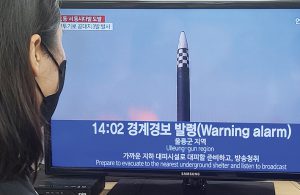The US condemned what it said was the test-launch of an intercontinental ballistic missile by North Korea on Thursday, as Pyongyang continued a barrage of weapons tests to protest allied military drills.
The US urged North Korea to halt further “destabilizing†tests and return to negotiations over its nuclear weapons program, State Department spokesman Ned Price said in a statement. The suspected ICBM was launched from an area near Pyongyang around 7:44 a.m. and flew eastward toward Japan, reaching an altitude of 1,920 kilometers (1,200 miles), according to South Korean data.
“This launch is a clear violation of multiple United Nations Security Council resolutions and demonstrates the threat the DPRK’s unlawful weapons of mass destruction and ballistic missile programs pose to its neighbors, the region, international peace and security and the global non-proliferation regime,†Price said, referring to North Korea’s formal name.
The Republic of Korea Air Force separately announced that its exercises with the US were being extended because of the “ongoing North Korean provocations.†An official with North Korea’s ruling party denounced the decision as a “huge mistake,†accusing the allies of pushing tensions to an “uncontrollable phase.â€
The missile was likely a Hwasong-17 that failed in flight, the Yonhap News Agency reported, citing an unidentified defense official, referring to a newer, larger rocket that was believed to have suffered a high-profile failure over Pyongyang in March. The South Korean Defense Ministry declined to comment on the report.
The missile was one of at least six fired by North Korea on Thursday, including five shorter-range rockets that flew over the sea between the Korean Peninsula and Japan. North Korea earlier this week threatened to take “powerful measures†if the US didn’t halt military drills with partners including South Korea, firing off at least 23 missiles on Wednesday.
North Korea is barred from conducting ballistic missile tests under UN resolutions intended to pressure Kim Jong Un to give up his nuclear weapons program. The US and its allies believe Kim, who in September reaffirmed his refusal to disarm, is laying the groundwork to conduct his first test of an atomic bomb in five years.
The US and South Korea this week started air drills known as Vigilant Storm that had been scheduled to run through Friday and involve about 240 aircraft in about 1,600 sorties to “hone their wartime capabilities,†the US 7th Air Force said in a statement. The drills have added to a series of joint exercises on land, sea and air in recent weeks, some of which have also included Japan.
South Korea said discussions on extending the Vigilant Storm drills were still underway and that no decision had been made on a new end date. North Korea demonstrated its opposition to the decision with a fresh volley of missile tests.
The suspected ICBM launch Thursday prompted Japan to issue text-message warnings, known as J-Alerts, for citizens to take cover. Tokyo initially said the missile flew over the country’s territory, although Japanese authorities later retracted that claim.
“At the time the J-Alert was activated, there was a possibility that the missile would pass over the Japanese archipelago —based on its trajectory — so the J-Alert was activated,†Chief Cabinet Secretary Hirokazu Matsuno told reporters in Tokyo. North Korea fired a ballistic missile over Japan last month, the first such test since 2017.
Washington, Tokyo and Seoul have promised a coordinated response if Pyongyang detonates an atomic device, which would also violate Security Council resolutions.
—Bloomberg
 The Gulf Time Newspaper One of the finest business newspapers in the UAE brought to you by our professional writers and editors.
The Gulf Time Newspaper One of the finest business newspapers in the UAE brought to you by our professional writers and editors.
